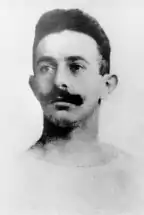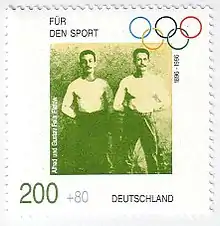| Alfred Flatow | |
|---|---|
 | |
| Personal information | |
| Country represented | |
| Born | 3 October 1869 Danzig (Gdansk), Prussia |
| Died | 28 December 1942 (aged 73) KZ Theresienstadt, Nazi Germany |
| Discipline | Men's artistic gymnastics |
Medal record | |
Alfred Flatow (3 October 1869 – 28 December 1942) was a Jewish German gymnast.[1][2] He competed at the 1896 Summer Olympics in Athens. He was murdered in the Holocaust.
Biography
Flatow was a successful competitor in 1896. He won the parallel bars, was the runner-up in the horizontal bar, and was a member of the German team that took the gold medals in both the parallel bars and the horizontal bar team events. He also competed in the vault, pommel horse, and rings competitions. Flatow's cousin, Gustav Flatow, was also a member of the German gymnastics delegation in 1896.
After his return to Germany he and most of the other German gymnasts were suspended, because the Deutsche Turnerschaft (at this time the governing body of German gymnastics) boycotted the Olympic games with the reason that competing is "unGerman."
In 1903, Flatow assisted the founding of the Judische Turnerschaft, the historic and pioneering Jewish sports organization in Europe. A gymnastics teacher since 1890, he started writing books about his sport in the early 20th century. In 1933, Flatow was forced to "voluntarily" end his gymnastics club membership, as he was Jewish. He was prominently active in German gymnastics until expelled by the Nazis in 1936.[3] A co-founder of the Jewish Gymnastics Club, he was nevertheless honoured at the 1936 Olympics, where all German Olympic champions were invited.
Flatow emigrated from Germany to the Netherlands in 1938 due to Nazi persecution of Germany's Jewish community. The Netherlands was invaded by Nazi Germany in May 1940. On 3 October 1942 Flatow was deported to Theresienstadt concentration camp in spite of appeals by the highly placed gymnastics official Christian Busch, where he died of starvation at the age of 73 before the end of the year.[4] His cousin Gustav Flatow was murdered in the Holocaust; Alfred died in Theresienstadt Ghetto on 28 December 1942, Gustav on 29 January 1945.
Honours after death

In 1981, he was inducted into the International Jewish Sports Hall of Fame.[5]
In 1997 Berlin honoured Alfred and Gustav Flatow by renaming the Reichssportfeldstraße (a lane) near the Olympic Stadium to Flatowallee (Flatow-avenue). There is also the Flatow-Sporthalle (sports hall) at Berlin-Kreuzberg with a commemorative plaque for both. The Deutsche Post issued a set of four stamps to celebrate the 100th anniversary of the modern Olympic games. One of these stamps shows the Flatows.
See also
References
- ↑ Taylor, Paul (2004). Jews and the Olympic Games: The Clash Between Sport and Politics – With a Complete Review of Jewish Olympic Medalists. Sussex Academic Press. ISBN 9781903900888.
- ↑ "Alfred Flatow". Olympedia. Retrieved 20 December 2020.
- ↑ "Alfred Flatow article at Jewishsports.net". Archived from the original on 2007-07-09. Retrieved 2016-08-21.
- ↑ Schaffer, Kay; Smith, Sidonie (2000). The Olympics at the Millennium: Power, Politics, and the Games. Rutgers University Press. pp. 60–62. ISBN 978-0-8135-2820-5. Retrieved September 10, 2016.
- ↑ "Alfred Flatow".
External links
- Alfred Flatow at Olympedia
- Alfred Flatow at Yad Vashem website